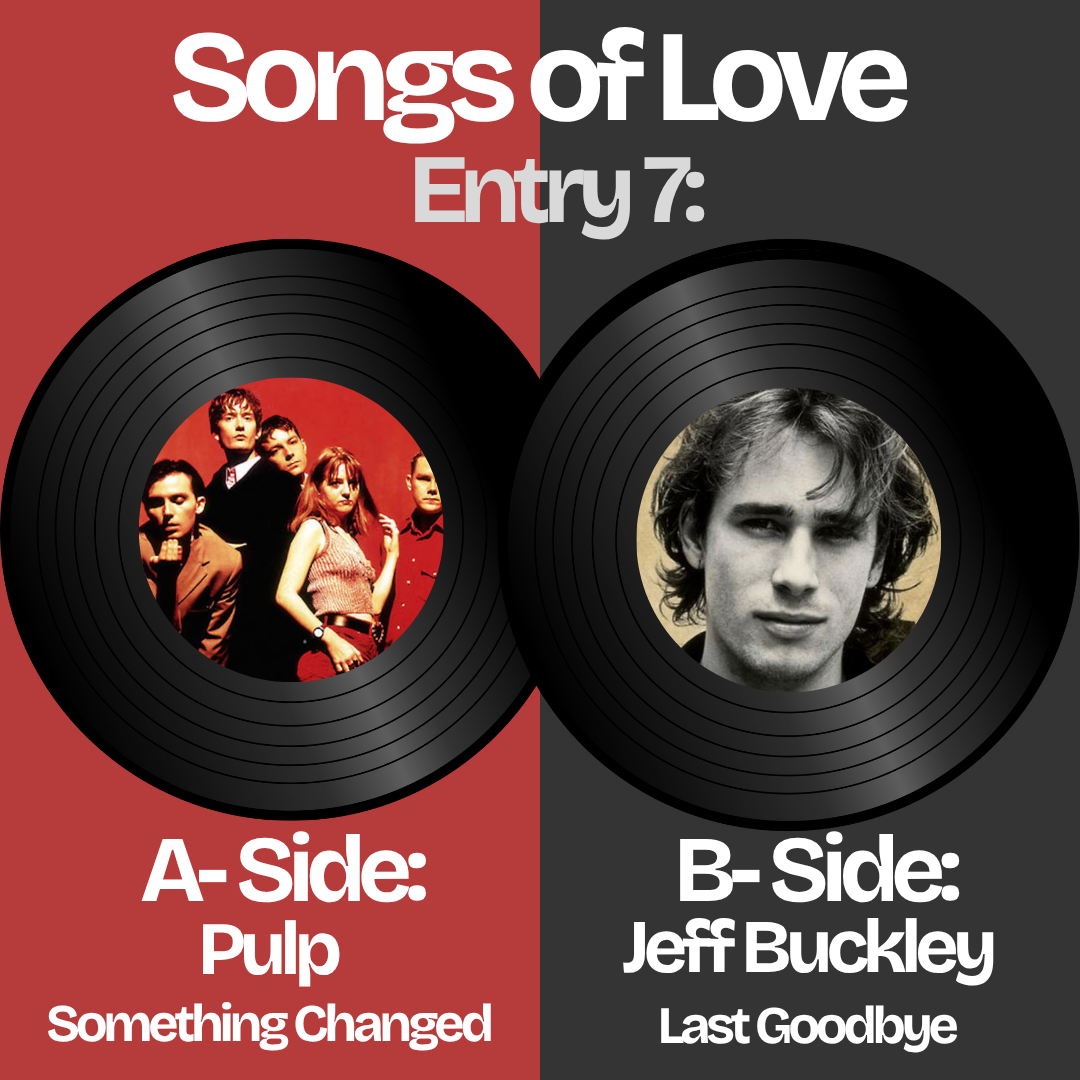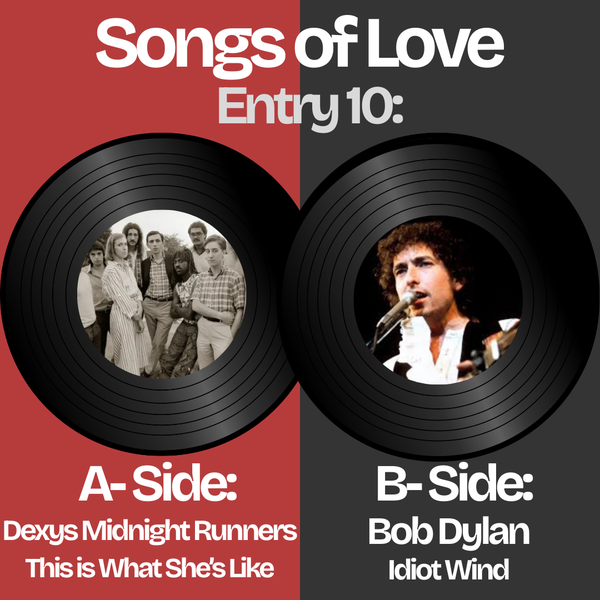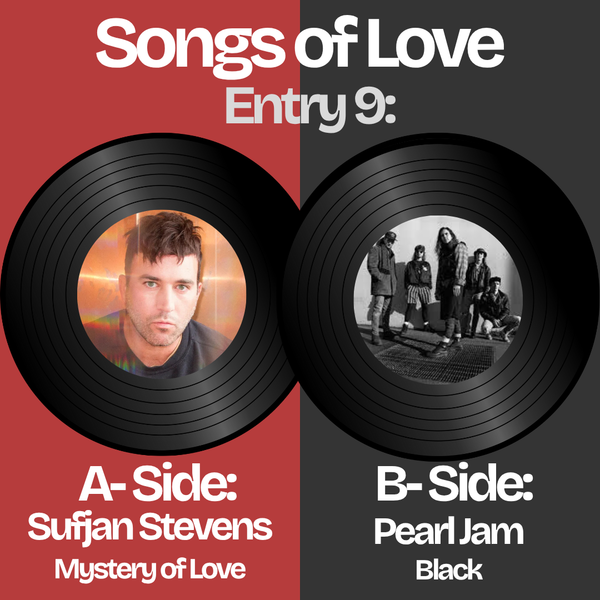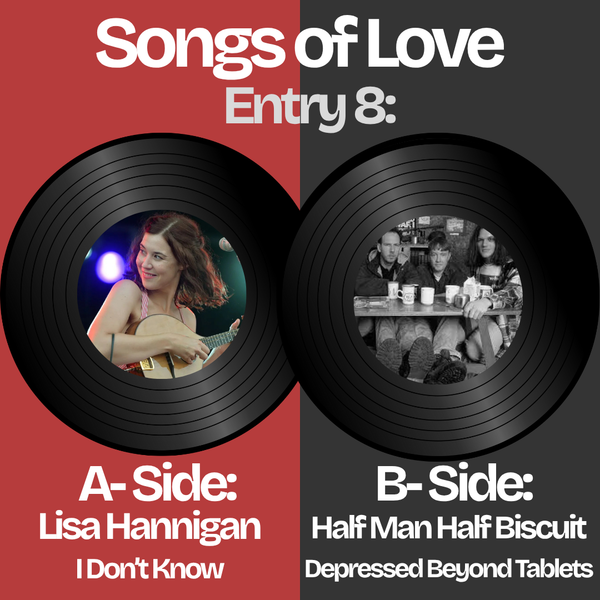Songs of Love 7

Here, two songs that came out within a year of each other, something that seems to happen more often than one might expect given that these songs are mostly chosen randomly. Both songs are from pivotal mid-90s albums, which were lauded at the time but have only grown in stature since (both also spawning their respective artist’s biggest hit, though while both songs we’re covering here were singles, neither is that hit). But beyond these similarities of release and status, there’s something else that unites these: both songs seem to enact a conversation. We’ll get on to how this works with the B-Side in particular, but in both cases these are at least in part songs that place the listener in a room, either a fly on the wall or taking some implicit part in a conversation, which only heightens their intimacy.
A-Side
Performed by Pulp
Written by Pulp
Released 1995
A lot of love songs are about destiny, about the idea of being drawn together by abstract cosmic forces utterly beyond your comprehension. The idea that your fate is outside of your own hands, or more prosaically, that the strength of your feelings for your lover is such that it simply must have a wider, universal significance beyond the human. The struggle against destiny is familiar from literature right back to the ancient Greeks, but many love songs choose quite the contrary; to luxuriate in destiny, to take it as a comforting assurance of the rightness of what is happening.
This song is different, in that it raises that question – “Do you believe that there’s someone up above/And does he have a timetable directing acts of love” – only to quash it – “stop asking questions that don’t matter anyway.” Because this is not a song about destiny or fate. Rather, this is a song about chance. About wondering, if only briefly, how things might have been different. But in so doing, it actually affirms the importance of the lovers’ meeting.
Often, a song will focus on a moment, or series of moments – a meeting, a sighting, a parting (temporary or permanent). One of the things that marks this song out is that it devotes a lot of time to giving context to that moment. The singer had just written this song[1] and decided to… well, what? We can only infer how they and their lover met, because the crucial moment is never actually portrayed or described. They (the singer) must have gone out, because the alternatives that we’re told about are staying home and going to the cinema. Whereas the lover didn’t see their friends, so presumably they went out by themself? But it couldn’t really have been a pre-arranged date, because the singer didn’t yet know their lover’s name. It’s all very nebulous. But then that’s part of what’s interesting here. Rather than tell us all about how the light shone on their lover’s face that first time, or what music was playing, the singer is more interested in the wider significance that this moment assumed. They’re looking back at this as a turning point, where not just something, but, by inference, everything changed.
This is quite a common thing in relationships, especially in particularly introspective or reflective people – pinpointing specific moments and wondering how things might have been different. Sometimes this ends up as a kind of melancholy spiralling, something we’ve seen plenty of in these songs. But other times, as here, it’s something more idle, a stray thought, one that can be cut off by the lover’s presence and the concomitant reminder to focus on the present. It depends on the person, on the situation and, perhaps most of all, on the moment being remembered. A meeting could always happen somewhere else, in another way, even if the singer here briefly ponders the possibility of ending up with someone else. But a parting, with its sense of finality, is another matter. Again, we’ve seen and will continue to see plenty of those.
But for all of that, what stands out here is the moving beyond, the dismissal, the recognition that this is itself just a passing moment. It’s certainly a healthier dynamic than the sort of being drawn back into the past of many other songs. And in that sense it’s striking that what occasions this moving beyond is the presence, and indeed the physical touch, of the lover. The singer here is able to focus on the present because that’s where their lover is. A lot of other singers don’t have that kind of luxury.
[1]One of those appealing paradoxes, like ‘Leaves That Are Green’ by Simon and Garfunkel which begins “I was twenty-one years when I wrote this song,” where you think “well, not this bit though, right?” But then that draws attention to the gap that exists between writing and performing, in which the song can be transformed in all kinds of ways.
B-Side
Performed by Jeff Buckley
Written by Jeff Buckley
Released 1994
A break-up is often, if it means anything, a battleground of warring emotions. Resentment, frustration, jealousy, anger, even contempt – any and all of these may bubble to the surface, but so too may lingering love and affection. This song is a magnificent encapsulation of that – a song of beauty and (sorry) grace, measured and respectful, but torn between extremes of emotion throughout.
Let’s start with a simple question: who is to blame for this break-up? Most songs will give us a pretty clear answer to that, whether it’s one of self-recrimination or bitterness, though some of the best are more measured and assert collective guilt. Here, though, we seem to alternate, or vacillate. At first, the singer seems to believe it’s them – “maybe it’s just because I didn’t know you at all,” “I know that in time/I’ll only make you cry.” Fair enough, then – they’ve identified some deficiency on their part; maybe they even feel they’re not worthy of their lover. Sad, but maybe admirable. But then later on we seem to get the reverse: “Was there a voice unkind in the back of your mind/Saying maybe/You didn’t know him at all.”[1] So here precisely the opposite seems to be suggested – that it was the lover who didn’t know the singer well enough for the relationship to last. But this accusation is attributed to a “voice unkind” – it’s entirely internal (and speculative on the singer’s part), and probably distorted. So there’s an even-handedness here – both parties in the break-up might be blaming themselves. Or so the singer speculates. In reality, they don’t know. They don’t have access to their former lover’s thoughts anymore, and they can’t now be sure if they ever really did.
Does the singer want the relationship to continue, or think it could? Again, mixed signals. There’s a sense of something inevitable throughout – “this is our last goodbye,” “it’s over,” as if something predestined is coming to its close (indeed that repeated “it’s over” marks the end of the song). But then we get to one of the most affecting parts of the song, where Buckley’s voice lifts into its higher register – “kiss me, please kiss me/Kiss me out of desire, baby, not consolation.” So clearly the singer still thinks there’s desire there, or wants there to be. They want to feel one last bit of that spark. But then why are they so worried about “consolation?” Up to this point, it’s seemed as though they were the one doing the breaking up, delivering the message, so why might their former lover be trying to console them? Surely it would be the other way around?
And another question – what exactly is happening in this song? Because unlike a lot of songs, this isn’t a reportage of events after the fact, or even an internal reflection. This song is the break-up – “just do this and then I’ll go.” There’s a long-running debate in lyric poetry theory about whether lyric poems should be understood as representing an actual speech act or not (yes, I go to all the fun conferences). This is further complicated with song lyrics which are actually sung aloud – does that performance constitute or reenact a speech act?[2] I don’t propose to solve this here, but it’s worth noting that the first three verses of the song seem to revolve around physical proximity. The first – “then I’ll go.” The second: “This is our last embrace.” The third: “Kiss me, please kiss me.” Then we get in the speculation with the fourth – “did you say ‘no, this can’t happen to me.’” Is this a rhetorical question, or one asked directly? At any rate, there’s no sense of an answer, and the speculation goes on for a whole verse. It certainly has the feel of an internal dialogue at this point. And finally the fifth verse begins “Well the bells out in the church tower chime.” I’ve always imagined this as the singer emerging onto the street and hearing those bells from nearby. Certainly at this point he’s only imagining his former lover – “thinking so hard on her soft eyes.” So then is she still hearing this song, or was only part of the song the actual message?
Like a lot of great art, the strangenesses and ambiguities really make this. The core of the song dances in the spaces between clear meanings. It’s confusing, even disorientating, because break-ups are. The sadness co-exists with competing emotions; even this reflective, self-deprecating singer admits “it makes me so angry,” even though it seems to be his own failings making him angry in this instance. It’s messy, and painful, and that’s what makes it true.
[1]I’ve gone with my own spacing of the lyrics here, contrary to all sources, on the basis that the voicing suggests that “Saying” is the beginning of a new line, while “maybe” has so much time devoted to it that it really has to constitute a line break. The question of how to space lyrics on the page in a wider sense falls very much into the “don’t get me started” category.
[2]My short answer: not necessarily, but it can represent one, as it seems to here. We may come back to this at some point.



